Plutarch's Lives (22 vols.)
Digital Logos Edition
Overview
Plutarch was a Greek historian, biographer, priest, and essayist. For nearly two millennia his writings have influenced some of the world’s greatest literary figures, including Shakespeare, Emerson, Montaigne, and others. The ethical discussions contained in Plutarch’s writings gave the American founding fathers the tools to formulate their own ideas about freedom and government. During his lifetime, his writings and lectures made him a celebrity on top of his role as priest of Apollo and mayor of the town of Chaeronea. Throughout the centuries, Plutarch has been referenced so frequently and in so many ways that some scholars estimate only a third or half of his works actually survive today.
Included in Plutarch’s Lives (22 vols.) are the 11 surviving biographical texts which Ralph Waldo Emerson called “a Bible of heroes.” These biographies pair famous Greeks with famous Romans to highlight their similarities. He was more concerned with character than history, which may be a reason Emerson also said, “we cannot read Plutarch without a tingling of the blood.”
This collection contains the complete texts in their Loeb Classical Library editions, translated by Bernadotte Perrin. Each text includes the original Greek and the English translation for easy side-by-side comparison. Logos’ language tools allow you to go deeper into the Greek text and explore Plutarch’s elegant language. Use the dictionary lookup tool to examine difficult English words used by the translator or challenging Greek words used by Plutarch. Students of literature, history, and philosophy will enjoy these works and appreciate their significance.

- 50 biographies of famous Greeks and Romans
- Loeb Classical Library editions
- Comparisons of the moral characters of similar people
Logos lets you study classic texts from across the centuries with unparalleled depth and efficiency. Primary texts and translations scroll in sync and side by side. Greek and Latin gloss and morphology appear with a single click. Notes and highlights sync across all of your devices. Quickly access information on difficult or unusual words, and get instant definitions, translations, and more. Discover new connections with Logos’ Timeline feature. Use Logos Groups to collaborate and share insights with others. With original-language data, cross-references, and rich media, Logos gives you an unparalleled experience and the academic advantage.
- Title: Plutarch’s Lives
- Author: Plutarch
- Translator: Bernadotte Perrin
- Series: Loeb Classical Library
- Publisher: G. P. Putnam’s Sons, Harvard University Press, and Macmillan and Co.
- Volumes: 22
- Pages: 5,755
Individual Titles
- Plutarch’s Lives, vol. 1: Theseus and Romulus, Lycurgus and Numa, Solon and Publicola
- Plutarch’s Lives, vol. 1: Theseus and Romulus, Lycurgus and Numa, Solon and Publicola: Greek Text
- Plutarch’s Lives, vol. 2: Themistocles and Camillus, Aristides and Cato Major, Cimon and Lucullus
- Plutarch’s Lives, vol. 2: Themistocles and Camillus, Aristides and Cato Major, Cimon and Lucullus: Greek Text
- Plutarch’s Lives, vol. 3: Pericles and Fabius Maximus, Nicias and Crassus
- Plutarch’s Lives, vol. 3: Pericles and Fabius Maximus, Nicias and Crassus: Greek Text
- Plutarch’s Lives, vol. 4: Alcibiades and Coriolanus, Lysander and Sulla
- Plutarch’s Lives, vol. 4: Alcibiades and Coriolanus, Lysander and Sulla: Greek Text
- Plutarch’s Lives, vol. 5: Agesilaus and Pompey, Pelopidas and Marcellus
- Plutarch’s Lives, vol. 5: Agesilaus and Pompey, Pelopidas and Marcellus: Greek Text
- Plutarch’s Lives, vol. 6: Dion and Brutus, Timoleon and Aemilius Paulus
- Plutarch’s Lives, vol. 6: Dion and Brutus, Timoleon and Aemilius Paulus: Greek Text
- Plutarch’s Lives, vol. 7: Demosthenes and Cicero, Alexander and Caesar
- Plutarch’s Lives, vol. 7: Demosthenes and Cicero, Alexander and Caesar: Greek Text
- Plutarch’s Lives, vol. 8: Sertorius and Eumenes, Phocion and Cato the Younger
- Plutarch’s Lives, vol. 8: Sertorius and Eumenes, Phocion and Cato the Younger: Greek Text
- Plutarch’s Lives, vol. 9: Demetrius and Antony, Pyrrhus and Caius Marius
- Plutarch’s Lives, vol. 9: Demetrius and Antony, Pyrrhus and Caius Marius: Greek Text
- Plutarch’s Lives, vol. 10: Agis and Cleomenes, and Tiberius and Caius Gracchus, Philopoemen and Flamininus
- Plutarch’s Lives, vol. 10: Agis and Cleomenes, and Tiberius and Caius Gracchus, Philopoemen and Flamininus: Greek Text
- Plutarch’s Lives, vol. 11: Aratus, Artaxerxes, Galba and Otho
- Plutarch’s Lives, vol. 11: Aratus, Artaxerxes, Galba and Otho: Greek Text

This volume contains the parallel biographies of Thesus and Romulus, Lycurgus and Numa, and Solon and Publicola.
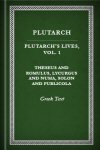
This volume contains the Greek text of the parallel biographies of Thesus and Romulus, Lycurgus and Numa, and Solon and Publicola.
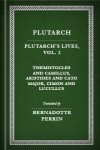
Plutarch’s Lives, vol. 2: Themistocles and Camillus, Aristides and Cato Major, Cimon and Lucullus
- Author: Plutarch
- Translator: Bernadotte Perrin
- Series: Loeb Classical Library
- Publisher: Macmillan and Co.
- Publication Date: 1914
- Pages: 322
This volume contains Bernadotte Perrin’s translation of the parallel biographies of Themistocles and Camillus, Aristides and Cato Major, and Cimon and Lucullus.
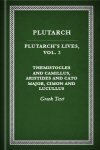
Plutarch’s Lives, vol. 2: Themistocles and Camillus, Aristides and Cato Major, Cimon and Lucullus: Greek Text
- Author: Plutarch
- Translator: Bernadotte Perrin
- Series: Loeb Classical Library
- Publisher: Macmillan and Co.
- Publication Date: 1914
- Pages: 320
This volume contains the Greek text of the parallel biographies of Themistocles and Camillus, Aristides and Cato Major, and Cimon and Lucullus.
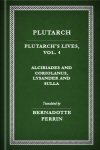
Plutarch’s Lives, vol. 3: Pericles and Fabius Maximus, Nicias and Crassus
- Author: Plutarch
- Translator: Bernadotte Perrin
- Series: Loeb Classical Library
- Publisher: G. P. Putnam’s Sons
- Publication Date: 1916
- Pages: 221
This volume contains Bernadotte Perrin’s translation of the parallel biographies of Pericles and Fabius Maximus, and Nicias and Crassus.

Plutarch’s Lives, vol. 3: Pericles and Fabius Maximus, Nicias and Crassus: Greek Text
- Author: Plutarch
- Translator: Bernadotte Perrin
- Series: Loeb Classical Library
- Publisher: G. P. Putnam’s Sons
- Publication Date: 1916
- Pages: 221
This volume contains the Greek text of the parallel biographies of Pericles and Fabius Maximus, and Nicias and Crassus.

Plutarch’s Lives, vol. 4: Alcibiades and Coriolanus, Lysander and Sulla
- Author: Plutarch
- Translator: Bernadotte Perrin
- Series: Loeb Classical Library
- Publisher: G. P. Putnam’s Sons
- Publication Date: 1916
- Pages: 240
This volume contains Bernadotte Perrin’s translation of the parallel biographies of Alcibiades and Coriolanus, and Lysander and Sulla.
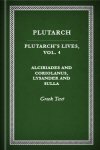
Plutarch’s Lives, vol. 4: Alcibiades and Coriolanus, Lysander and Sulla: Greek Text
- Author: First M. Last
- Translator: Bernadotte Perrin
- Series: Loeb Classical Library
- Publisher: G. P. Putnam’s Sons
- Publication Date: 1916
- Pages: 240
This volume contains the Greek text of the parallel biographies of Alcibiades and Coriolanus, and Lysander and Sulla.
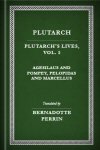
Plutarch’s Lives, vol. 5: Agesilaus and Pompey, Pelopidas and Marcellus
- Author: Plutarch
- Translator: Bernadotte Perrin
- Series: Loeb Classical Library
- Publisher: G. P. Putnam’s Sons
- Publication Date: 1917
- Pages: 275
This volume contains Bernadotte Perrin’s translation of the parallel biographies of Agesilaus and Pompey, and Pelopidas and Marcellus.
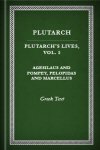
Plutarch’s Lives, vol. 5: Agesilaus and Pompey, Pelopidas and Marcellus: Greek Text
- Author: Plutarch
- Translator: Bernadotte Perrin
- Series: Loeb Classical Library
- Publisher: G. P. Putnam’s Sons
- Publication Date: 1917
- Pages: 275
This volume contains the Greek text of the parallel biographies of Agesilaus and Pompey, and Pelopidas and Marcellus.
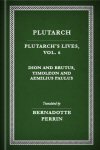
Plutarch’s Lives, vol. 6: Dion and Brutus, Timoleon and Aemilius Paulus
- Author: Plutarch
- Translator: Bernadotte Perrin
- Series: Loeb Classical Library
- Publisher: Macmillan and Co.
- Publication Date: 1918
- Pages: 240
This volume contains Bernadotte Perrin’s translation of the parallel biographies of Dion and Brutus, and Timoleon and Aemilius Paulus.
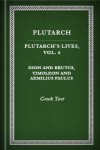
Plutarch’s Lives, vol. 6: Dion and Brutus, Timoleon and Aemilius Paulus: Greek Text
- Author: Plutarch
- Translator: Bernadotte Perrin
- Series: Loeb Classical Library
- Publisher: Macmillan and Co.
- Publication Date: 1918
- Pages: 240
This volume contains the Greek text of the parallel biographies of Dion and Brutus, and Timoleon and Aemilius Paulus.
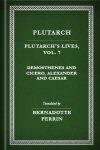
Plutarch’s Lives, vol. 7: Demosthenes and Cicero, Alexander and Caesar
- Author: Plutarch
- Translator: Bernadotte Perrin
- Series: Loeb Classical Library
- Publisher: Macmillan and Co.
- Publication Date: 1919
- Pages: 312
This volume contains Bernadotte Perrin’s translation of the parallel biographies of Demosthenes and Cicero, and Alexander and Caesar.
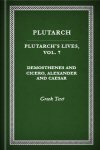
Plutarch’s Lives, vol. 7: Demosthenes and Cicero, Alexander and Caesar: Greek Text
- Author: Plutarch
- Translator: Bernadotte Perrin
- Series: Loeb Classical Library
- Publisher: Macmillan and Co.
- Publication Date: 1919
- Pages: 305
This volume contains the Greek text of the parallel biographies of Demosthenes and Cicero, and Alexander and Caesar.
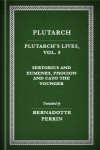
Plutarch’s Lives, vol. 8: Sertorius and Eumenes, Phocion and Cato the Younger
- Author: Plutarch
- Translator: Bernadotte Perrin
- Series: Loeb Classical Library
- Publisher: Macmillan and Co.
- Publication Date: 1919
- Pages: 211
This volume contains Bernadotte Perrin’s translation of the parallel biographies of Sertorius and Eumenes, and Phocion and Cato the Younger.
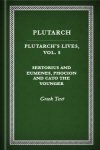
Plutarch’s Lives, vol. 8: Sertorius and Eumenes, Phocion and Cato the Younger: Greek Text
- Author: Plutarch
- Translator: Bernadotte Perrin
- Series: Loeb Classical Library
- Publisher: Macmillan and Co.
- Publication Date: 1919
- Pages: 211
This volume contains the Greek text of the parallel biographies of Sertorius and Eumenes, and Phocion and Cato the Younger.

Plutarch’s Lives, vol. 9: Demetrius and Antony, Pyrrhus and Caius Marius
- Author: Plutarch
- Translator: Bernadotte Perrin
- Series: Loeb Classical Library
- Publisher: Macmillan and Co.
- Publication Date: 1920
- Pages: 310
This volume contains Bernadotte Perrin’s translation of the parallel biographies of Demetrius and Antony, and Pyrrhus and Caius Marius.
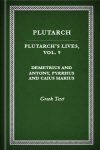
Plutarch’s Lives, vol. 9: Demetrius and Antony, Pyrrhus and Caius Marius: Greek Text
- Author: Plutarch
- Translator: Bernadotte Perrin
- Series: Loeb Classical Library
- Publisher: Macmillan and Co.
- Publication Date: 1920
- Pages: 310
This volume contains the Greek text of the parallel biographies of Demetrius and Antony, and Pyrrhus and Caius Marius.
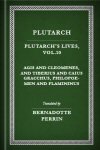
Plutarch’s Lives, vol. 10: Agis and Cleomenes, and Tiberius and Caius Gracchus, Philopoemen and Flamininus
- Author: Plutarch
- Translator: Bernadotte Perrin
- Series: Loeb Classical Library
- Publisher: Macmillan and Co.
- Publication Date: 1921
- Pages: 200
This volume contains Bernadotte Perrin’s translation of the parallel biographies of Agis and Cleomenes, Tiberius and Caius Gracchus, and Philopoemen and Flamininus.
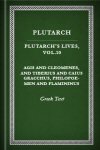
Plutarch’s Lives, vol. 10: Agis and Cleomenes, and Tiberius and Caius Gracchus, Philopoemen and Flamininus: Greek Text
- Author: Plutarch
- Translator: Bernadotte Perrin
- Series: Loeb Classical Library
- Publisher: Macmillan and Co.
- Publication Date: 1921
- Pages: 245
This volume contains the original Greek text of the parallel biographies of Agis and Cleomenes, Tiberius and Caius Gracchus, and Philopoemen and Flamininus.

Plutarch’s Lives, vol. 11: Aratus, Artaxerxes, Galba and Otho
- Author: Plutarch
- Translator: Bernadotte Perrin
- Series: Loeb Classical Library
- Publisher: Macmillan and Co.
- Publication Date: 1926
- Pages: 245
This volume contains Bernadotte Perrin’s translation of the parallel biographies of Aratus, Artaxerxes, Galba and Otho.
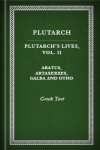
Plutarch’s Lives, vol. 11: Aratus, Artaxerxes, Galba and Otho: Greek Text
- Author: Plutarch
- Translator: Bernadotte Perrin
- Series: Loeb Classical Library
- Publisher: Macmillan and Co.
- Publication Date: 1926
- Pages: 245
This volume contains the original Greek text of the parallel biographies of Aratus, Artaxerxes, Galba and Otho.
Plutarch (AD 46–120), renamed Lucius Mestrius Plutarchus when he became a Roman citizen, held several significant social and cultural roles throughout his lifetime, including priest, magistrate, mayor, and according to some early historians, a procurator. Over the last two millennia his writings have been translated into English, Italian, French, Latin, German, and Hebrew. His most significant contributions are the biographies of Parallel Lives, also known simply as Lives, and the collection of essays entitled Moralia.
About Bernadotte Perrin
Bernadotte Perrin (1847–1920) graduated from Yale in 1869, and taught there as a tutor and professor of Greek. For a time, he was a professor at Western University and the assistant principal at Hartford High School. According to The New York Times, Perrin “is regarded as a high authority on classical philology, philosophy, and the ancient languages.”